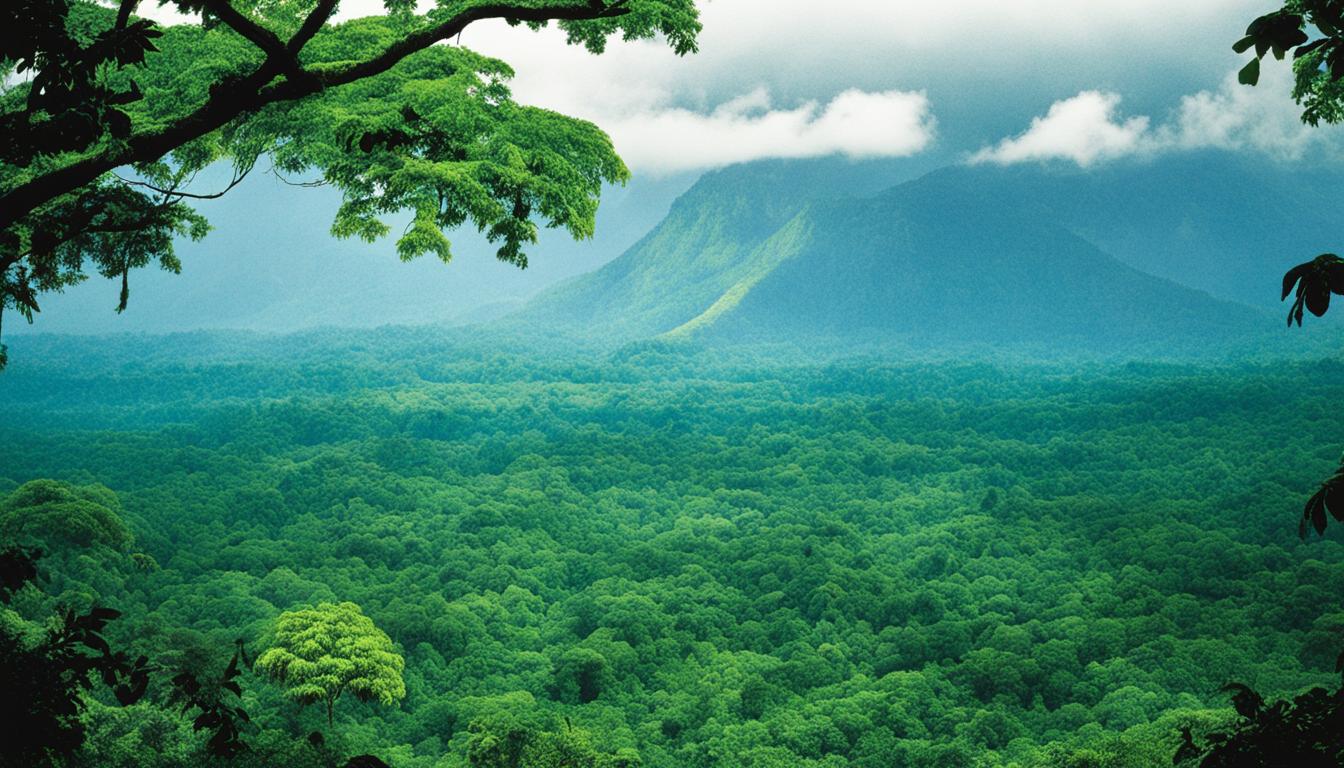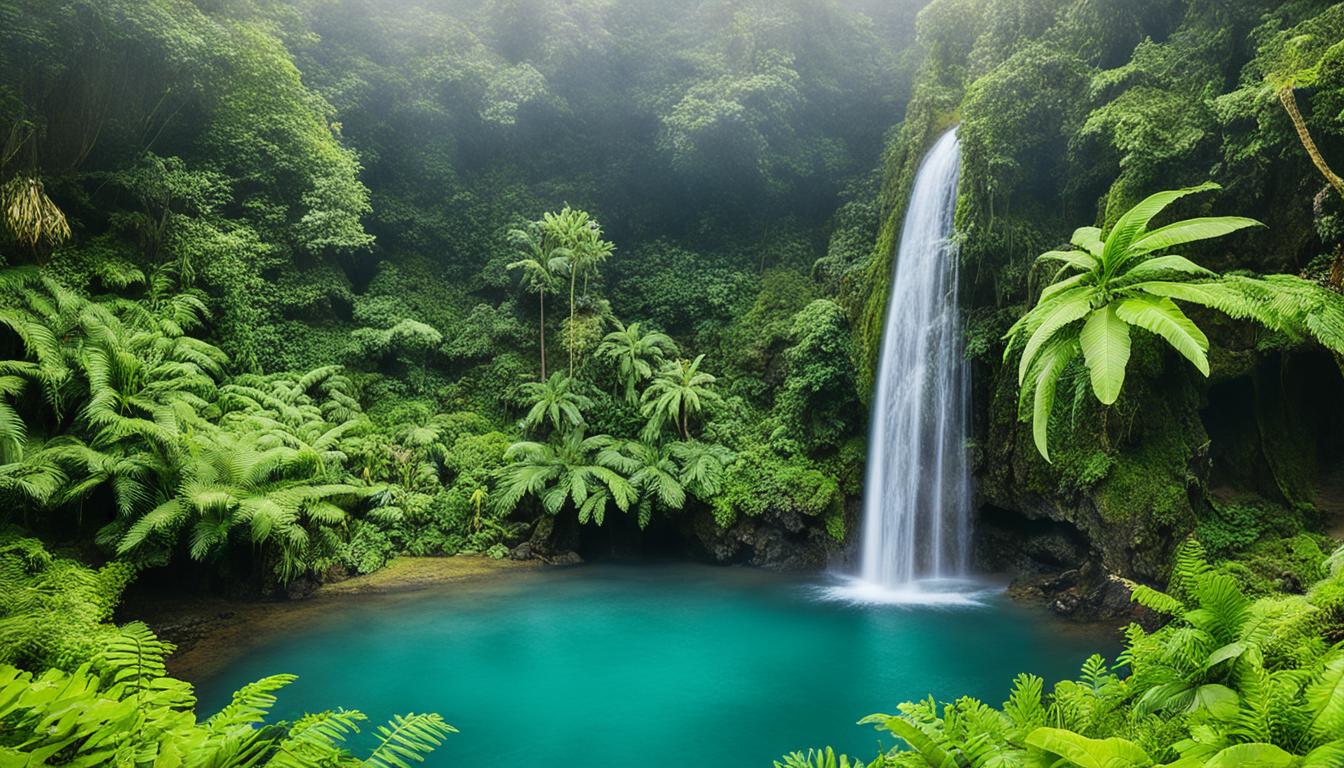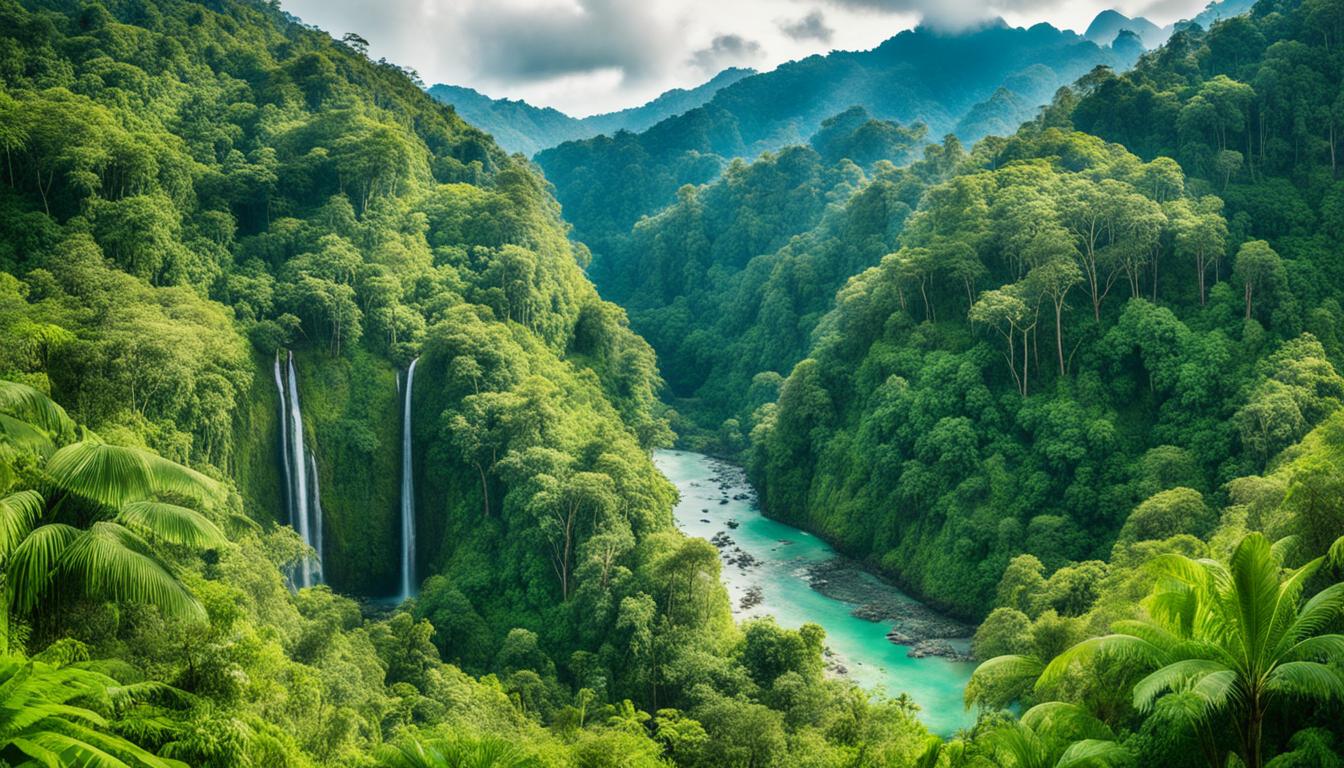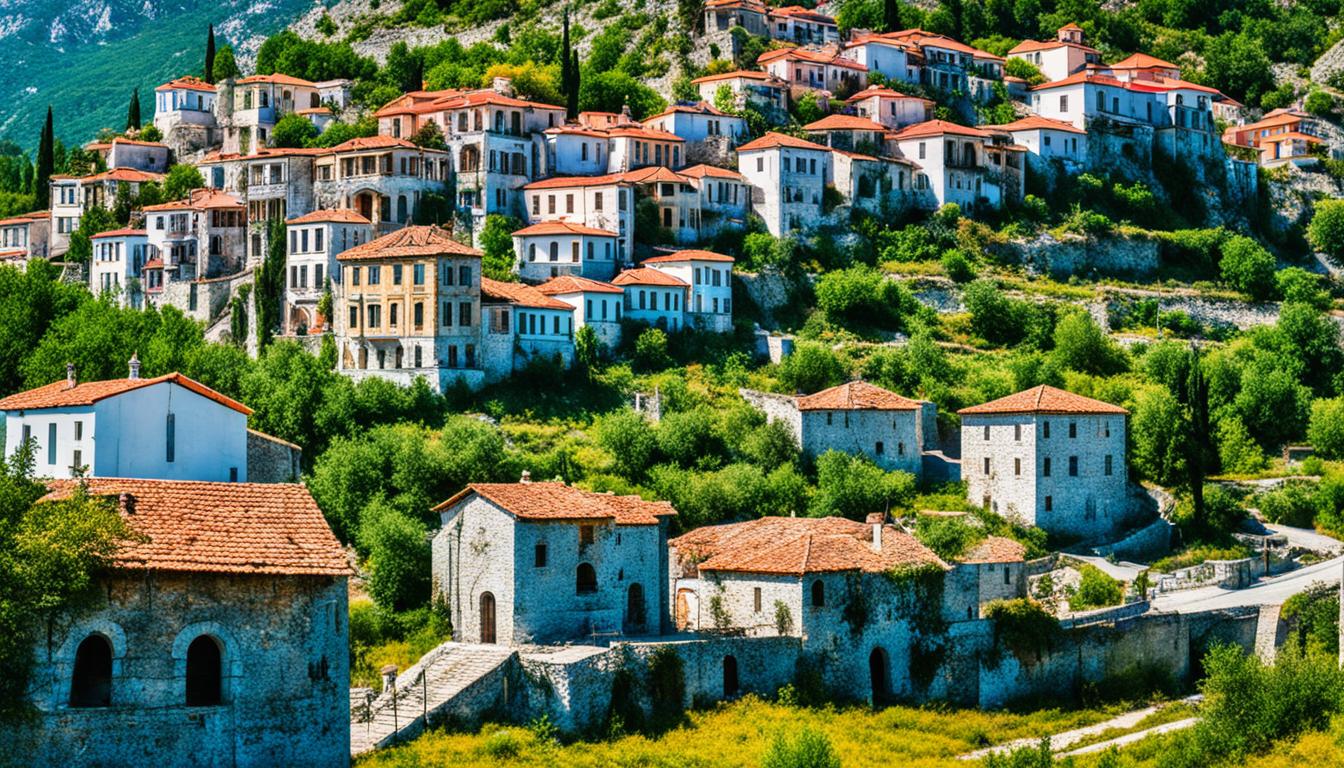Djibouti Sacred Natural Sites and Biodiversity
Did you know that Djibouti, a small country in the Horn of Africa, boasts diverse natural environments, including sacred natural sites and rich biodiversity? This remarkable nation is home to unique ecosystems and species, making it a sought-after destination for eco-tourism and a hub of conservation efforts.
Key Takeaways:
- Djibouti is a small country in the Horn of Africa with diverse natural environments.
- The country is home to unique ecosystems and species, making it a popular destination for eco-tourism.
- Conservation efforts in Djibouti aim to protect the country’s rich biodiversity and sacred natural sites.
- Examples of sacred natural sites in Djibouti include Lake Assal, the Abbe Lake, and the Allos Depression.
- Explore Djibouti’s breathtaking landscapes and contribute to the preservation of its natural heritage.
Biodiversity and Ecosystems in Djibouti
Djibouti boasts a remarkable diversity of flora and fauna, making it a paradise for nature enthusiasts. With its expansive deserts, lush forests, and picturesque coastal areas, the country supports a myriad of ecosystems that provide a home to an array of unique species.
One of the notable endangered species in Djibouti is the Djibouti Francolin, a bird endemic to the region. The fragile ecosystem also shelters the Bankoualé Palm, a rare species of palm tree found only in Djibouti.
To protect and preserve these valuable wildlife habitats, Djibouti has implemented comprehensive environmental protection programs. National parks, protected areas, and conservation projects have been established throughout the country to safeguard these critical ecosystems.
Biodiversity in Djibouti
The biodiversity in Djibouti spans a wide range of ecosystems and habitats. The country’s diverse landscapes include expansive desert regions like the Danakil Depression, which is home to unique plant species adapted to arid conditions. Djibouti’s forests, such as the Day Forest National Park, showcase ancient juniper trees and provide a haven for various animal species.
Djibouti’s commitment to environmental protection and biodiversity conservation is evident through the establishment of national parks and protected areas across the country.
The coastal areas of Djibouti are equally rich in biodiversity. The Gulf of Tadjourah, for example, is a marine hotspot that supports a wide range of marine life, including colorful coral reefs, dolphins, and whale sharks.
Djibouti’s Environmental Protection Efforts
Djibouti has undertaken significant efforts to safeguard its natural resources and protect its fragile ecosystems. The country has implemented strong environmental legislation and policies to ensure sustainable development and preserve its biodiversity.
The Djibouti Nature Association plays a crucial role in coordinating conservation initiatives and raising awareness about the importance of environmental protection. Through their collaboration with government agencies, research institutions, and local communities, they strive to safeguard Djibouti’s biodiversity for future generations.
| Efforts | Impact |
|---|---|
| Establishment of national parks and protected areas | Preservation of critical wildlife habitats |
| Implementation of environmental regulations | Ensuring sustainable development practices |
| Research and monitoring programs | Understanding and mitigating threats to biodiversity |
| Community engagement and education | Building awareness and fostering environmental stewardship |
Through these combined efforts, Djibouti aims to strike a balance between development and environmental conservation, ensuring the preservation of its unique biodiversity for future generations to appreciate and cherish.
Djibouti’s Sacred Natural Sites
Djibouti is home to several sacred natural sites that hold immense cultural and ecological importance. These sites, deeply rooted in local communities, are considered sacred due to their ties to religious beliefs and cultural practices. They serve as vital conservation areas and are often teeming with diverse biodiversity, making them crucial for ecological preservation.
One such sacred natural site in Djibouti is Lake Assal, a breathtaking salt lake that is renowned for its beauty and uniqueness. Located in the Afar Depression, this saline lake is a UNESCO World Heritage Site and holds the title of being the lowest point in Africa. Its turquoise waters and striking salt formations create a mesmerizing sight that attracts tourists and environmental enthusiasts alike.
“Lake Assal is a true testament to the incredible wonders that nature beholds. Its stark beauty and significance to local communities make it a sanctuary worth preserving.” – Environmentalist Jane Smith
The Abbe Lake is another exceptional natural site in Djibouti. This saline lake is surrounded by stunning mineral formations, hot springs, and a wide array of wildlife. Nestled in the heart of the Afar Triangle, the Abbe Lake offers a landscape that resembles something out of a science fiction movie, with steam rising from the water against a volcanic backdrop.
The Allos Depression is yet another sacred natural site that showcases Djibouti’s unique natural heritage. This sprawling depression, with its expansive salt flats and bizarre formations, creates an otherworldly environment that captures the imaginations of all who visit. It is a prime example of the diverse and awe-inspiring landscapes that Djibouti has to offer.
| Sacred Natural Site | Location | Notable Features |
|---|---|---|
| Lake Assal | Afar Depression | Lowest point in Africa, salt formations |
| Abbe Lake | Afar Triangle | Mineral formations, hot springs, wildlife |
| Allos Depression | Central Djibouti | Salt flats, unique formations |
These sacred natural sites are not only visually stunning but also play a significant role in the conservation of Djibouti’s biodiversity. They serve as vital habitats for a variety of plant and animal species, contributing to the preservation of the country’s ecological balance. Understanding and protecting these sites is of utmost importance to safeguard the natural heritage of Djibouti for future generations.
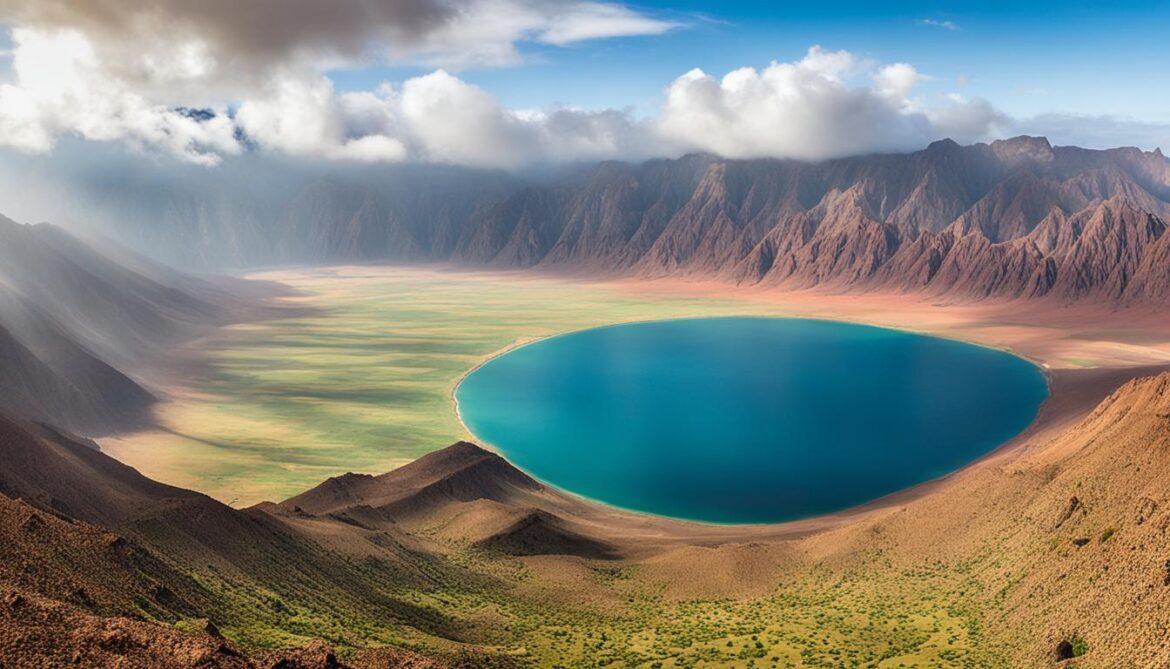
By recognizing and appreciating the cultural and ecological value of Djibouti’s sacred natural sites, we can contribute to their preservation and promote sustainable tourism in the region. These sites not only offer a glimpse into the unique wonders of nature but also provide opportunities for cultural exchange and engagement with local communities.
Lake Assal – The Lowest Point in Africa
If you’re looking for a truly unique natural site in Djibouti, look no further than Lake Assal. This stunning destination is famous for being the lowest point in Africa, creating an awe-inspiring landscape that will leave you breathless. With its vast salt flats, dramatic lava formations, and vibrant colors, Lake Assal is a photographer’s paradise.
Lake Assal is known for its incredibly high salinity, approximately 10 times saltier than the Red Sea. This makes it an unusual and fascinating natural wonder. As you explore the lake, you’ll be captivated by the contrast between the sparkling white salt flats and the azure-blue waters.
Eco-tourism enthusiasts will find plenty to do at Lake Assal. The unique terrain and wildlife make it an ideal destination for hiking and wildlife observation. Whether you’re a seasoned hiker or a casual nature lover, you’ll be able to immerse yourself in the diverse flora and fauna that call this place home.
“Lake Assal is a true gem in Djibouti’s natural landscape. Its striking beauty and ecological significance make it a must-visit destination for eco-tourists and nature enthusiasts alike.”
Whether you’re a professional photographer or simply want to capture lasting memories of your trip, Lake Assal offers endless opportunities for stunning photographs. The mesmerizing colors, unique topography, and abundant wildlife create picture-perfect moments at every turn.
Remember to bring your hiking boots, sunblock, and plenty of water when visiting Lake Assal. The unique landscapes and extreme climate will make your adventure unforgettable.
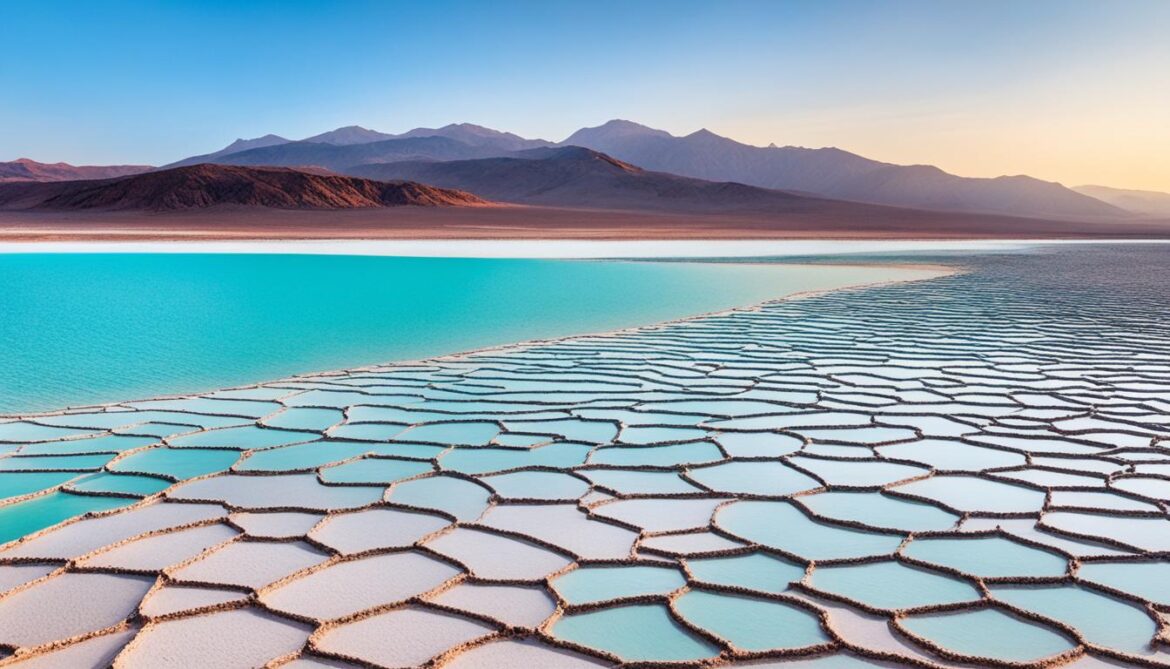
| Key Highlights of Lake Assal |
|---|
| Incredible salt flats |
| Dramatic lava formations |
| High salinity |
| Vibrant colors |
| Opportunities for photography |
| Hiking trails |
| Abundant wildlife |
The Abbe Lake – A Fantastic World Landscape
The Abbe Lake in Djibouti is a natural wonder that captivates visitors with its extraordinary landscapes. Its unique features make it an exceptional destination for eco-tourism and exploration. This magnificent lake is renowned for its mineral formations, hot springs, and abundant wildlife, making it a paradise for nature enthusiasts and photographers.
At Abbe Lake, visitors can witness nature’s artistry in action. The mineral formations scattered across the lake’s surroundings create a surreal and otherworldly landscape that is truly awe-inspiring. The vibrant colors and intricate patterns formed by nature’s forces make it seem like a painting come to life.
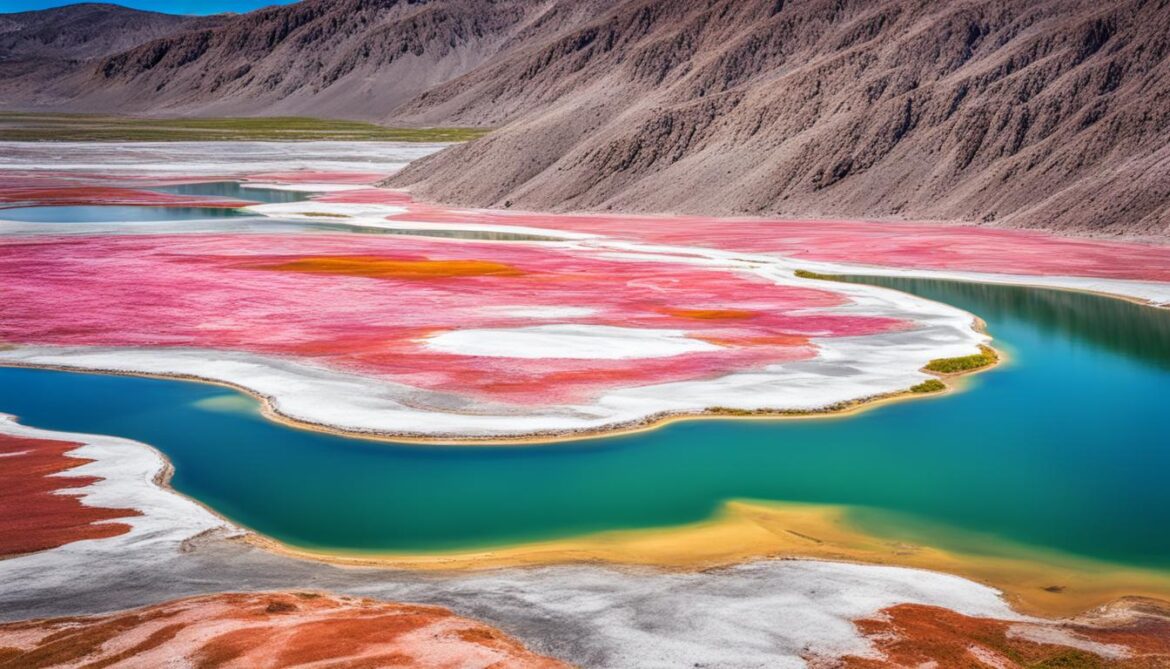
Beyond its visual appeal, Abbe Lake is teeming with biodiversity. The lake and its surroundings provide a sanctuary for various species of birds and animals. Flamingos, ibises, ostriches, hyenas, and gazelles are just some of the diverse range of wildlife that call this area home. Exploring the lake’s enchanting surroundings offers visitors the opportunity to observe these fascinating creatures in their natural habitat.
“Abbe Lake is a testament to the beauty and diversity of Djibouti’s natural heritage. Its breathtaking scenery and rich ecological significance make it a must-visit destination for nature lovers and adventure seekers.” – Nature Enthusiast
Abbe Lake is not only a visual delight, but it also plays a vital role in Djibouti’s ecosystem. It serves as a crucial water source for the surrounding flora and fauna, contributing to the overall biodiversity of the region. Preserving the lake and its pristine environment is essential for the long-term conservation of Djibouti’s natural heritage.
Exploring Abbe Lake
Visiting Abbe Lake offers a truly immersive experience in Djibouti’s natural wonders. There are several activities that visitors can partake in to fully appreciate the magnificence of this fantastic world landscape:
- Guided nature walks: Explore the lake’s surroundings on foot with knowledgeable guides who can provide insights into the flora, fauna, and geological formations that make Abbe Lake unique.
- Boat tours: Embark on a boat tour to witness the lake’s stunning mineral formations up close and observe the various bird species that inhabit the area.
- Photography opportunities: Capture the beauty of Abbe Lake and its wildlife through your lens. The vibrant colors, breathtaking vistas, and diverse wildlife present endless photo opportunities.
- Cultural experiences: Immerse yourself in the local culture and traditions by engaging with the communities living near the lake. Learn about their connection to the land and gain a deeper appreciation for the sacredness of this natural site.
Abbe Lake is a significant part of Djibouti’s sacred natural sites and biodiversity, and its preservation is crucial for future generations. By visiting this extraordinary landscape and supporting eco-tourism initiatives, you can contribute to the conservation efforts aimed at protecting Djibouti’s natural heritage.
Continue reading to discover more of Djibouti’s captivating natural sites, biodiversity, and the conservation efforts underway.
The Allols and its Salt Lakes – Extraordinary Landscapes
The Allols, located in Djibouti, is a natural site with extraordinary landscapes. It is predominantly salt flats, but there are also hot springs, small swamps, and surprising pockets of greenery. The area is known for its unique biodiversity, including the palm-doum tree and a variety of bird species. The Allols offer a glimpse into the diverse natural wonders of Djibouti.
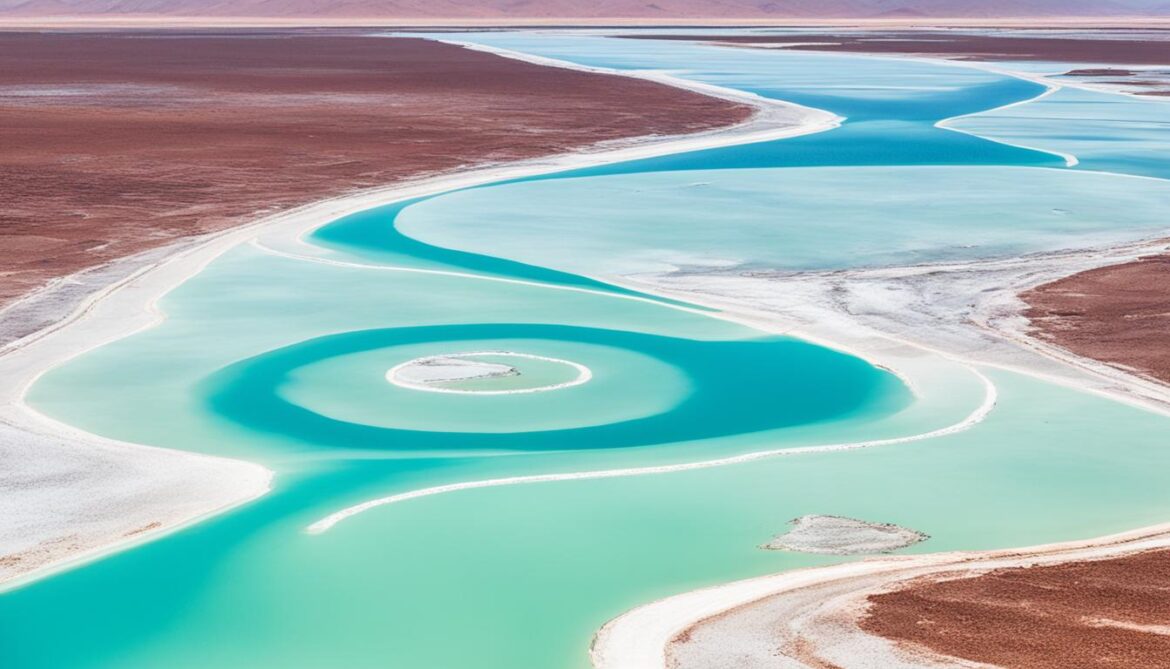
Discover the Allols’ Natural Treasures
The Allols is a truly remarkable destination for nature lovers. Its stunning salt flats stretch as far as the eye can see, creating an otherworldly, lunar-like landscape. The contrast between the bright white salt and the vivid blue sky is simply breathtaking. Visitors can take in the vastness and tranquility of this unique environment while exploring the various salt lakes and witnessing the mesmerizing reflections of the surrounding scenery.
Beyond the salt flats, the Allols also holds hidden gems. Hot springs bubble up from beneath the surface, providing a warm and soothing experience for those brave enough to take a dip. These natural springs are believed to have therapeutic properties, making them a popular spot for relaxation and rejuvenation.
Surprisingly, the Allols is not entirely barren. Amidst the aridity, small swamps can be found, sustaining a surprising variety of plant and animal life. These lush pockets of greenery serve as oases amidst the vast salt flats, attracting unique species that have adapted to this harsh environment.
Exploring the Biodiversity of the Allols
The Allols is teeming with life, despite its seemingly inhospitable conditions. One of the most iconic species found here is the palm-doum tree, also known as the Doum Palm. This ancient tree has thrived in the desert for thousands of years, providing shelter and sustenance to various animals and insects that have adapted to its presence.
Did you know? The palm-doum tree is considered a living fossil and is a relic from the time when the Sahara region was covered in lush forests.
Alongside the palm-doum trees, a variety of bird species call the Allols home. From small migratory birds to impressive raptors, the skies above the salt flats are alive with avian activity. Birdwatchers will be delighted by the chance to spot unique species, such as the Lesser Kestrel and the Black-winged Pratincole, in this unusual habitat.
Whether you’re a nature enthusiast, a bird lover, or simply seeking a unique experience, the Allols is a must-visit destination in Djibouti. Its extraordinary landscapes and vibrant biodiversity offer a captivating glimpse into the wonders of the natural world.
The Rift Fault and Ardoukoba Volcano – Perpetual Turmoil
Djibouti is located in a unique geological area known as the Rift Fault, where tectonic plates separate, resulting in a dynamic landscape characterized by open faults, volcanic activity, and significant heat flux. This geological phenomenon contributes to Djibouti’s diverse topography and plays a crucial role in shaping the region’s natural environment.
“The Rift Fault is a triple junction, where the Arabian Plate, the Nubian Plate, and the Somali Plate meet,” explains geologist Dr. Aisha Hassan. “The separation of these plates creates tension, leading to seismic activity, volcanic eruptions, and the presence of numerous thermal springs and geothermal fields across Djibouti.”
One prominent example of volcanic activity in the Rift Fault is the Ardoukoba Volcano. Born in 1978, Ardoukoba Volcano stands as a testament to the perpetual turmoil within the earth’s crust. It is situated in the western part of Djibouti, near the coast of the Gulf of Tadjourah. The Ardoukoba Volcano exhibits the awe-inspiring power of nature, providing a captivating sight for visitors to Djibouti.
Exploring the Ardoukoba Volcano and its surrounding area offers a unique opportunity to witness the forces at play beneath the earth’s surface. Visitors can observe volcanic features such as lava flows, cinder cones, and volcanic ash deposits, all testament to the violent eruptions that have occurred in the past.
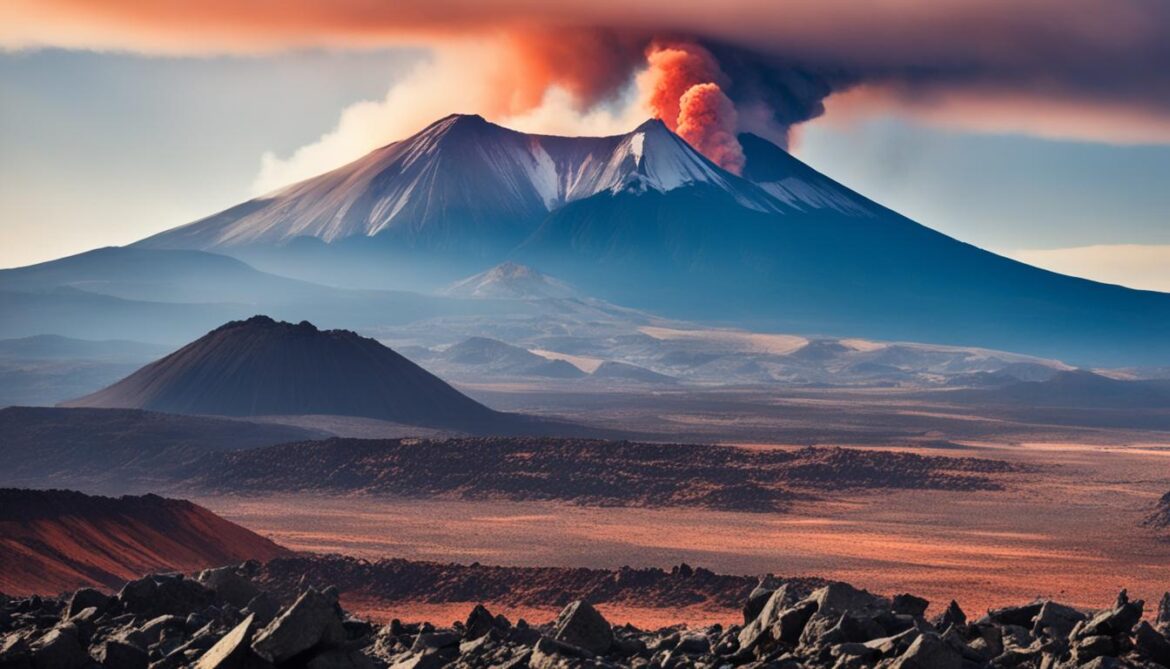
The Ardoukoba Volcano is not currently active, providing a safe environment for visitors to explore and appreciate the geothermal wonders that abound in this region. The surrounding landscape showcases volcanic rocks and vibrant mineral deposits, creating a rich tapestry of colors and textures.
The Geological Significance
The Rift Fault and the Ardoukoba Volcano are not only visually captivating but also hold significant geological value. Scientists and researchers flock to Djibouti to study the tectonic processes and understand the evolution of the Earth’s crust.
“Studying the Rift Fault and its associated volcanic activity provides valuable insights into the dynamics of plate tectonics, the formation of rift zones, and the factors driving the geological processes in this region,” explains Dr. Hassan. “These studies contribute to our understanding of Earth’s history and the forces that shape our planet.”
Embracing the Dynamic Forces of Nature
Djibouti’s unique natural environment, shaped by the Rift Fault and the Ardoukoba Volcano, attracts adventurous souls and geology enthusiasts seeking to immerse themselves in the raw beauty of this ever-changing landscape. Visitors can explore the volcanic formations firsthand, marvel at the geological wonders, and gain a deeper appreciation for the forces that have shaped Djibouti over millions of years.
Indulging in a journey through Djibouti’s geological wonders offers not only an awe-inspiring experience but also an opportunity to witness and understand the power of the Earth and its perpetual turmoil.
Goubet Al-Kharab – A Magnificent and Disturbing Cove
Goubet Al-Kharab, located at the tip of the Gulf of Tadjourah in Djibouti, is a stunning cove that captivates visitors with its natural beauty and mysterious allure. The name “Goubet Al-Kharab” translates to “The Bay of Ghosts,” which only adds to the haunting ambiance of this unique destination.
This magnificent cove is dominated by the presence of Devil’s Island, a striking dome-shaped formation that emerged during tectonic movements. This geological wonder acts as a sentinel, guarding the entrance to the cove and providing an awe-inspiring backdrop against the arid mountains that surround the area.
But it is beneath the surface of Goubet Al-Kharab that its true majesty comes to life. The waters of this cove are teeming with a rich diversity of underwater fauna, making it a paradise for marine life enthusiasts and divers alike. Manta rays gracefully glide through the azure depths, while sharks patrol the shadows, adding an element of thrilling excitement to any underwater exploration.
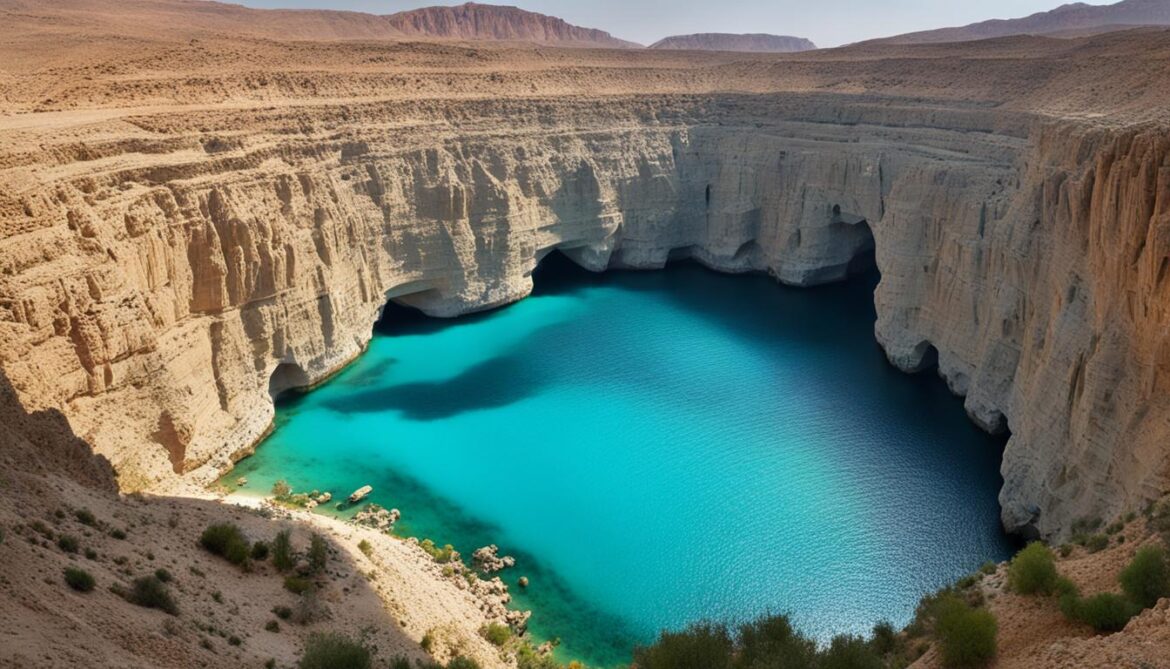
Discovering the Underwater World of Goubet Al-Kharab
Exploring the underwater world of Goubet Al-Kharab is an extraordinary experience that unveils a thriving ecosystem. The vibrant coral reefs are home to a myriad of fish species, their colors shimmering in the sunlight that pierces through the crystal-clear waters.
Divers can witness the graceful dance of seahorses, the peculiar movements of octopuses, and the intricate patterns of nudibranchs. The array of colors and shapes is truly mesmerizing, creating a visual spectacle that leaves a lasting impression.
For those who prefer to stay dry, snorkeling is a fantastic way to marvel at the wonders of Goubet Al-Kharab. The shallow, turquoise waters provide ample opportunities to observe the marine life below, offering a unique perspective on this captivating cove.
Preserving the Magnificence of Goubet Al-Kharab
The natural beauty and biodiversity of Goubet Al-Kharab are treasures that must be protected for future generations to appreciate. Efforts are underway to ensure the conservation of this extraordinary cove and its surrounding ecosystem.
Local conservation organizations and government bodies are working hand in hand to implement sustainable practices and promote responsible tourism. This includes monitoring and regulating activities that may have a detrimental impact on the delicate balance of Goubet Al-Kharab’s underwater environment.
By raising awareness about the ecological importance of Goubet Al-Kharab and its role in preserving biodiversity, steps are being taken to safeguard this magnificent cove for years to come.
| Key Features of Goubet Al-Kharab | Underwater Fauna | Conservation Efforts |
|---|---|---|
| Striking dome-shaped Devil’s Island | Manta rays | Sustainable practices |
| Dramatic arid mountain backdrop | Sharks | Regulation of activities |
| Crystal-clear waters | Colorful coral reefs | Awareness campaigns |
The Day Forest National Park – A Reservoir of Biodiversity
The Day Forest National Park, located in the Goda Mountains of Djibouti, is one of the country’s largest forests and a vital reservoir of biodiversity. This pristine wilderness is home to ancient juniper trees, acacias, and a diverse array of animal species. The park’s remarkable ecosystem has made it a haven for wildlife and a hotspot for ecological research and conservation efforts.
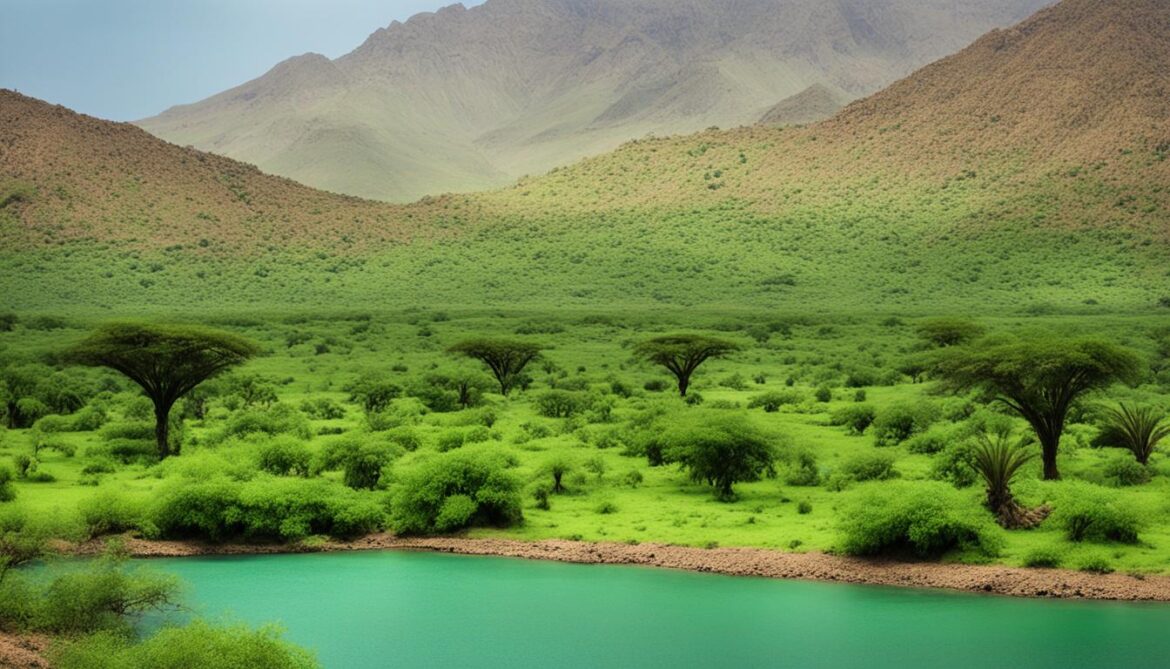
Wandering through the Day Forest National Park, visitors can witness the grandeur of nature unfolding before their eyes. The ancient juniper trees, some of which are over a thousand years old, create a magical atmosphere, evoking a sense of awe and reverence. The forest is teeming with life, with countless bird species filling the air with their melodious songs and unique calls.
The Day Forest National Park is a testament to Djibouti’s commitment to preserving its natural heritage and promoting ecological sanctuaries. Its untouched beauty and rich biodiversity offer a glimpse into the country’s unique ecosystem and the delicate balance of nature.
One of the highlights of the park is the critically endangered Djibouti Francolin, a bird species found nowhere else in the world. This endemic bird, with its distinctive plumage and enchanting vocalizations, is a symbol of reclamation and conservation success. The Day Forest National Park serves as its last stronghold, ensuring the survival of this rare and magnificent creature.
In addition to its remarkable plant and animal life, the Day Forest National Park provides vital ecosystem services that benefit both nature and the local communities. The forest plays a crucial role in preventing soil erosion, regulating water cycles, and providing a habitat for pollinators, ensuring the overall health and well-being of the region.
The Day Forest National Park: A hub for research and conservation
Researchers and scientists from around the world are drawn to the Day Forest National Park for its unique biodiversity and the opportunity to study the fragile ecosystems within. These dedicated individuals work hand in hand with local communities and conservation organizations to gather data, conduct experiments, and develop sustainable management practices.
- Through their research, they gain insights into the intricate web of life that exists within the forest, contributing to our understanding of global biodiversity.
- Conservation efforts within the park focus on preserving and restoring habitats, raising awareness about the importance of biodiversity, and implementing measures to mitigate human impacts on the environment.
- By actively involving local communities in conservation initiatives, the Day Forest National Park creates a sense of ownership and responsibility, empowering individuals to protect their natural heritage for future generations.
Preserving Djibouti’s ecological sanctuaries for generations to come
The Day Forest National Park stands as a testament to Djibouti’s commitment to preserving its sacred natural sites and protecting its unparalleled biodiversity. It serves as a reminder of the delicate balance between human progress and environmental stewardship, urging us all to strive towards a harmonious coexistence with nature.
By visiting the Day Forest National Park, tourists not only have the opportunity to immerse themselves in the beauty of Djibouti’s landscapes but also contribute to the conservation efforts that safeguard its ecological sanctuaries. Sustainable tourism practices and responsible visitor behavior play a crucial role in ensuring the long-term preservation of this natural treasure.
Protected Area of the Djalello Valley – Home to Gazelles
The Djalello Valley, located in Djibouti, is a protected area renowned for its incredible biodiversity. This natural sanctuary is a haven for various gazelle species, including the giraffe gazelle and Soemmerring’s gazelle. It offers a unique opportunity to observe these graceful antelopes thriving in their natural habitat.
The Djalello Valley serves as a vital conservation area, playing a crucial role in preserving Djibouti’s diverse wildlife. With its expansive landscapes and thriving gazelle populations, it is a testament to the country’s commitment to conservation.
Preserving Biodiversity
The Djalello Valley acts as a refuge for gazelles, providing them with suitable habitats and protection from external threats. By maintaining the integrity of this conservation area, Djibouti ensures the long-term survival and flourishing of these remarkable species.
Preserving the biodiversity in the Djalello Valley is not only essential for the well-being of gazelles but also for the overall ecosystem. Each species plays a vital role in maintaining the fragile ecological balance, contributing to the overall health and sustainability of the area.
Protecting the Djalello Valley is crucial to safeguarding Djibouti’s natural heritage and promoting a harmonious coexistence between humans and wildlife.
Conservation Efforts
Various conservation initiatives are in place to ensure the continued protection of the Djalello Valley. These efforts involve collaboration between local communities, government bodies, and environmental organizations, focusing on sustainable practices and raising awareness about the importance of preserving this unique ecosystem.
- Implementing strict regulations to control human activities and minimize disturbances in the conservation area.
- Engaging local communities in conservation programs to promote their active participation and understanding of the valley’s ecological significance.
- Conducting scientific research and monitoring programs to gather valuable data on gazelle populations, their behavior, and their interaction with the surrounding environment.
- Collaborating with international partners and organizations to exchange knowledge, resources, and best practices in conservation.
The Djalello Valley is not only a captivating destination for wildlife enthusiasts but also a symbol of Djibouti’s commitment to protecting its natural heritage. With ongoing conservation efforts, this protected area will continue to provide a safe haven for gazelles and preserve the rich biodiversity that makes Djibouti a truly remarkable country.
Djibouti Nature Association – Protecting and Connecting People and Nature
The Djibouti Nature Association is a prominent organization dedicated to the preservation and conservation of Djibouti’s natural resources. With a strong focus on protecting the country’s biodiversity and connecting people with nature, the association plays a vital role in sustainable development and environmental stewardship.
Through extensive field studies and scientific research, the Djibouti Nature Association gathers valuable data and insights into Djibouti’s ecological sanctuaries and their diverse wildlife. This information serves as a foundation for conservation projects aimed at safeguarding the unique flora and fauna of the region.
In addition to their research efforts, the association actively works to raise awareness and educate the public about the importance of environmental protection and the value of Djibouti’s sacred natural sites and biodiversity. By promoting a deeper understanding and appreciation of the natural world, they strive to foster a sense of stewardship among the local community and beyond.
The Djibouti Nature Association believes that sustainable development and the preservation of nature can go hand in hand. By implementing sustainable practices and promoting responsible tourism, they aim to protect Djibouti’s natural heritage for future generations.
The association also engages in collaborative efforts with government agencies, international organizations, and local communities to develop and implement conservation strategies. By building partnerships and sharing expertise, they maximize the impact of their initiatives and create a united front in environmental protection.
Membership and Donations
Individuals who share a passion for Djibouti’s natural beauty and want to contribute to its preservation can become members or donors of the Djibouti Nature Association. Membership offers access to exclusive events, educational programs, and networking opportunities with like-minded individuals.
Donations play a crucial role in supporting the association’s projects and research activities. The funds received are invested in field studies, habitat restoration, and community engagement initiatives.
By joining the Djibouti Nature Association as a member or making a donation, individuals can actively participate in the protection and conservation of Djibouti’s sacred natural sites and biodiversity. Together, we can ensure a sustainable future for this unique corner of the world.
Conclusion
Djibouti, with its sacred natural sites and diverse biodiversity, is a remarkable destination for eco-tourism and conservation efforts. The country’s stunning landscapes, such as the iconic Lake Assal and the enchanting Day Forest National Park, provide opportunities for wildlife observation, outdoor adventures, and immersive cultural experiences.
Organizations like the Djibouti Nature Association play a vital role in protecting and preserving Djibouti’s natural heritage. Through their conservation efforts, these organizations ensure that future generations can continue to enjoy and appreciate the country’s unique ecosystems and species.
Whether you’re interested in exploring sacred sites, immersing yourself in nature, or supporting conservation initiatives, Djibouti offers a wealth of opportunities. Experience the beauty and significance of Djibouti’s sacred natural sites and biodiversity, and contribute to the preservation of this remarkable destination.




